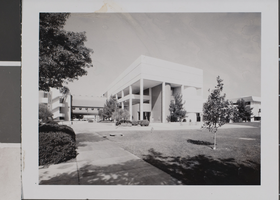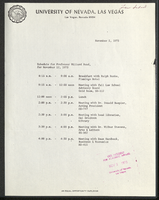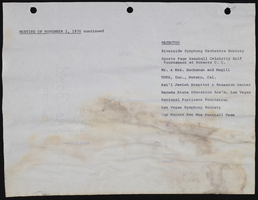Search the Special Collections and Archives Portal
Search Results

Photograph of James R. Dickinson Library, University of Nevada, Las Vegas, circa 1980s
Date
Archival Collection
Description
The newer addition of the James R. Dickinson Library and the Carlson Education Building (right) on the University of Nevada, Las Vegas (UNLV) campus.
Image

Photograph of University of Nevada, Las Vegas, circa 1980s
Date
Archival Collection
Description
Aerial view of track and Physical Education buildings at the University of Nevada, Las Vegas (UNLV) campus. Image is looking southwest.
Image
Nevada. Governor’s Advisory Council on Education Relating to the Holocaust
The Governor’s Advisory Council on Education Relating to the Holocaust was established by the Nevada Legislature in 1989 under Nevada Revised Statute 233G. The duties of the Council are to develop educational programs for children and adults on issues related to the Holocaust, to create reports, and to advise public and private bodies throughout Nevada on Holocaust education. It is also responsible for its own fundraising, although some money is allocated by the legislature. The Council consists of eleven members appointed by the governor.
Corporate Body

Transcript of interview with Pauline Barlow and Katie Ford by Caroline Logsdon, March 20, and April 7, 1976
Date
Archival Collection
Description
On March 20, 1976 Caroline Logsdon interviewed Pauline Barlow (unknown date or place of birth) about her life in Southern Nevada. Barlow first talks about her move to Las Vegas at a young age, her church membership, and her membership in social clubs. She also talks about gambling, the atomic testing, and the changes she has seen over time in Las Vegas. On April 7, 1976, Logsdon also interviewed Katie Ford (born 1929 in Ely Nevada) about her life in Southern Nevada. Ford talks about her early life and education in Nevada in Beatty, Nevada, her work with her family-owned gas station and hotel, and some of the early buildings in Beatty. She also discusses early recreational activities, the atomic testing, economic and environmental changes, improvement in technology, and social changes.
Text


University of Nevada, Las Vegas law school planning: schedule, committee notes, correspondence, and reports
Date
Archival Collection
Description
Folder includes Citizens Ad Hoc Law School Committee notes by Janice S. Gould, "Final Report on Law Program (1967-68)", and correspondence and memos related to legal education at Nevada Southern University (later UNLV). From the University of Nevada, Las Vegas William S. Boyd School of Law Records (UA-00048).
Text
Paul Sorensen oral history interview
Identifier
Abstract
Oral history interview with Paul Sorensen conducted by Bill Friday on February 27, 1979 for the Ralph Roske Oral History Project on Early Las Vegas. In this interview, Sorensen discusses the history of Clark County and Las Vegas, Nevada. Sorensen discusses education in Las Vegas, reasons for the growth of Clark County, and the establishment of the Nevada Test Site. Sorensen later describes how Las Vegas and its school system has changed, and discusses who he believes are moving to live in Las Vegas the most. Sorensen goes on to discuss racial segregation in Las Vegas and racial integration in the schools via busing.
Archival Collection
Gary Marsh Scrapbook on Nevada History
Identifier
Abstract
The Gary Marsh Scrapbook on Nevada History consists of one scrapbook with newspaper clippings from the Las Vegas Review-Journal (LVRJ) and the LVRJ Sunday supplement, the Nevadan dating from 1963 to 1964. Topics include information on Nevada history, industry, natural resources, society, and culture. The scrapbook likely represents a school project completed by Marsh.
Archival Collection

